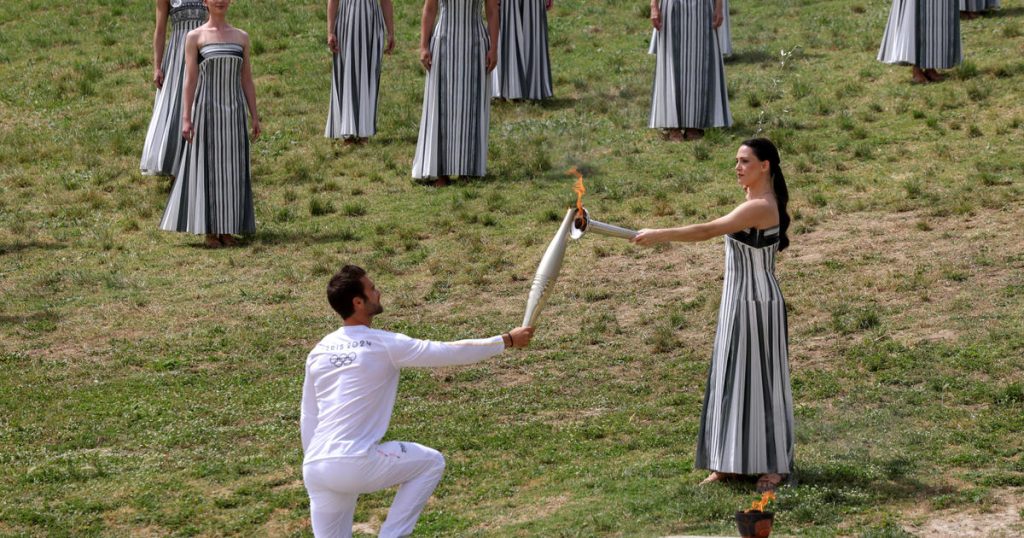The torch relay for the 2024 Paris Olympics has officially begun, with the Olympic flame being lit in Olympia, Greece. The torch, a symbol that connects the event back to its ancient roots, will be carried to the host city of Paris through various modes of transportation, including a three-masted sailboat across the Mediterranean Sea to Marseille, France. The torch will then travel around France and its islands before arriving in Paris for the opening ceremony on July 26. Boats will carry the torch to islands such as Martinique and French Polynesia, with a complete list of stops available on the Olympics website. The relay will be live-streamed and is expected to take 68 days to complete the 3,100-mile journey.
A selection process began in June 2023 to choose the 10,000 athletes who will participate in the torch relay, with each athlete assigned a specific segment of the route to carry the flame. The torch never goes out during the relay, as a new torch is specially designed for each Olympics to withstand various elements. The flame is fueled by gas and placed in a special cauldron overnight before being passed on to the next torchbearer. A special ceremony was held in Olympia, with an actress lighting the flame at the temple of the Greek goddess Hera.
The tradition of the Olympic torch relay dates back to the 1928 Amsterdam Olympics, with the inaugural relay taking place in 1936 before the Berlin Olympics. Since then, the relay has been a significant part of every Summer Olympics, as stated in the Olympic rule book. Olympic swimmer Florent Manaudou was selected as a leader for one of the relay segments and expressed his excitement at being part of such a symbolic and prestigious tradition. This tradition not only showcases the sporting aspect of the Olympics but also highlights the landscapes and culture of the host country.
The Paris 2024 Olympic medals will feature pieces of iron from the Eiffel Tower, adding a unique and historical element to the design. The Eiffel Tower, an iconic landmark in Paris, represents the heritage and culture of the host city and country. This decision to use iron from the Eiffel Tower reflects the importance of incorporating historical and symbolic elements into the design of Olympic medals, further connecting the event to the host city and its rich history. The use of materials with historical significance adds a sense of legacy and tradition to the medals, making them more than just a symbol of athletic achievement.
The lighting of the Olympic flame in Olympia marks the beginning of the countdown to the Paris 2024 Olympics, with the torch relay symbolizing the journey and unity of athletes from around the world. The relay serves as a reminder of the ancient traditions and values of the Olympics, connecting past and present generations of athletes. As the torch makes its way through various regions of France, it symbolizes the spirit of competition and camaraderie that define the Olympic games. The inclusion of historical materials, such as iron from the Eiffel Tower, in the design of the medals further emphasizes the importance of tradition and heritage in celebrating athletic excellence on a global stage.
Overall, the Paris 2024 Olympics promise to be a celebration of history, culture, and unity, with the torch relay and medal design reflecting the rich heritage of the host city and country. The inclusion of historical elements in both the torch relay and medal design highlights the importance of tradition and legacy in the Olympic movement. As athletes and spectators anticipate the opening ceremony in Paris, the symbolism of the torch relay and the design of the medals serve as reminders of the values and spirit of the Olympic games. With the flame now lit in Olympia, the countdown to the Paris 2024 Olympics has officially begun, bringing together athletes and fans from around the world in a celebration of sport and unity.


